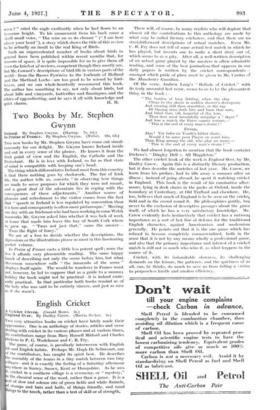English Cricket
England Over. By Dudley Carew. (Martin Sockor. 3s.)
I'wo very attractive books on cricket have lately made their ppearance. One is an anthology of stories, articles and verse dealing with cricket in its various phases and at various times. is contributors range. from Mary Russell Mitford and Charles ckens to P. G. Wodehouse and C. B. Fry. , The game, of course, is peculiarly interwoven with English 're and English habits. Perhaps Mr. Hugh De Selincourt, one the contributors, has caught its spirit best. He describes he assembly of the teams. in a tiny match between two tiny illages--and it is exactly the feeling of a Saturday afternoon nYwhere in Surrey, Sussex, Kent or Hampshire. As he sees t, cricket in a southern•village is a ceremony, or " mystery," the classical sense of the word, rather than a game. It is a 'it of slow and solemn rite of green fields and white flannels, ,f stumps and bats and balls, of things friendly, and rural flings to the touch, rather than a test of skill or of strength. There will, of course, be many readers who will deplore that almost all the contributions to this anthology are made by what may be called literary cricketers, and that there are no straightforward descriptions of actual matches. Even Mr. C. B. Fry does not tell of some actual test match in which he has played, but invents one to make a short story out of, which seems to us a pity. After all, a well-written description of an actual game played by the masters is often admirable reading, and some of the best journalism that appears in our daily papers is written by the cricket correspondents—
amongst which pride of place must be given to Mr. Cardus of the Manchester Guardian.
Of the verse, Andrew Lang's " Ballade of Cricket," with its truly mournful last verse, seems to us to be the pleasantest thing in the book :—
" The burden of long folding, when the clay Clings to thy shoos in sudden shower's downpour,
And running still thou stumblest, or the ray Of blazing suns cloth bite and burn thee sore, And blind thee, till, forgetful of thy lore, Thou dolt most mournfully misjudge a " skyer " And lose a match the Fates cannot restore,— 'Ilia is the end of every man's desire ! '
ENVOY.
Alas ! Yet liefer on Youth's hither shore, Would I be some poor Player on scant hire, Than King among the old, who play no more,- ' This is the end of every man's desire ! ' "
We had almost forgotten to mention that the book contains Dickens's " Dingley Dell v. All Muggleton."
The other cricket book of the week is England Over, by Mr.
Dudley Carew. Again this is a distinctly literary production, but it does describe the matches of last year. Mr. Carew, we learn from his preface, had to idle away it summer after an illness ; instead of going abroad, he spent it watching cricket in England. This book is the result of his ruminative after- noons, lying in deck chairs in the parks at Oxford, inside the boundary at Canterbury, at Old Trafford and elsewhere. Ile, too, believes that much of England is to be seen on the cricket field and in the crowd round it. He philosophizes gently, but never to the exclusion of descriptive passages about the game itself, of which he has a very satisfactory knowledge. Mr. Carew evidently feels instinctively that cricket has a national importance as a sort of last line of defence for the traditional English character, against Americanism and modernism generally. He points out that it is the one game which has refused to become completely commercialized, both in the sense that it is not by any means wholly a professional game, and also that the primary importance and interest of a cricket match is still not so much who wins it, us what happens in the course of it.
Cricket, with its indomitable slowness, its challenging demands on the leisure, the patience, and the quietness of us all, can, he thinks, do much to save us from falling a victim to purposeless hustle and aimless efficiency.






































 Previous page
Previous page